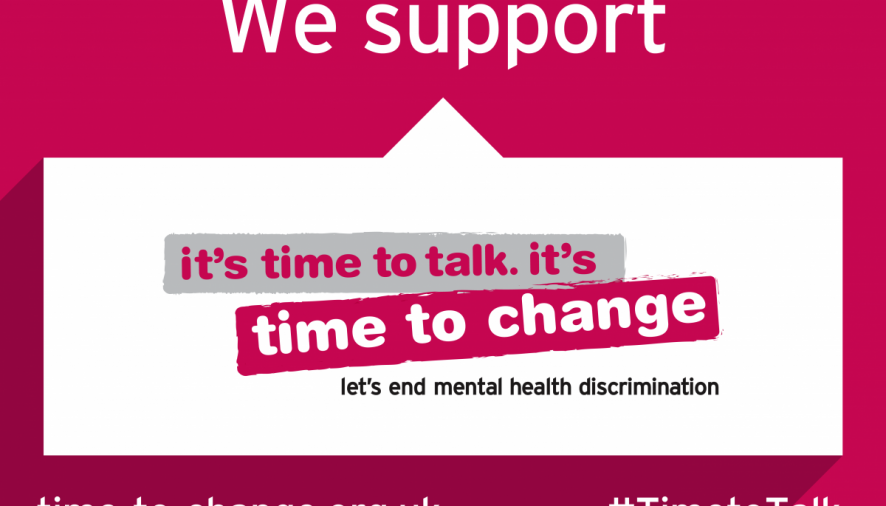On the 4th of the February, it was ‘Time to Change’ day. Now, some of you might not know what this day exactly is, or it may be the first time you’ve heard of it – but I must stress that is one of the biggest landmarks in the fight against mental health stigma, and its important and promising that we finally have a day devoted to destroying the stigma surrounding mental health.
To describe Time to Change day, it is a day masterminded by the anti-stigma charity Time to Change, an offshoot from the leading mental health charities Mind and Rethink Mental Illness and is dedicated to improving attitudes surrounding mental health. It might seem trivial or unnecessary to those who have never experienced stigma, but as someone who personally uses mental health services I can vouch that stigma is indeed a devastating and sadly pertinent reality for mental health sufferers. What’s more, 87% of those who have a mental health problem state they have experienced discrimination that has impacted upon them negatively according to Time to Change. Considering that the NHS reports up to 1 in 4 people experience a mental health problem at some point in their life, that then 2means the sheer amount of people suffering from stigma is staggering.
Mental health is certainly a topic that is misunderstood by many. It’s often romanticised or vilified in the popular media, and it’s frequently distorted in extreme portrayals through films, music and television. Very rarely do we see honest portrayals of mental health sufferers as, well, normal people. Rather, many who suffer from mental health in the mainstream media are portrayed as serial killers, tortured geniuses or unhinged psychopaths. And this has real world effects – it makes it harder for people to open up and harder for people to seek the help they need for fear of being stigmatised. Many people simply place themselves in isolation and suffer in silence, without getting help.
What’s worst is the number of needless deaths that would have been avoided if this was addressed earlier. Suicide remains the leading killer of young men, and the NHS estimates that 90% of people who attempt or die by suicide suffer from a mental health condition, with many refusing to disclose it to others and seek the proper medical aid.
If we treated mental health as it should be treated then we’d avoid so much unnecessary tragedy. It’s important to note the word ‘health’ in mental health – our mental health is just as important as our physical health but many treat it as inferior in importance. No doubt many people who have disclosed that they are feeling severely depressed or anxious to employers or friends were told to simply “get over it”, as if stating these three words would alter their brain chemistry and allow them to ‘get over’ their debilitating condition. But, more often than not, this isn’t the case – one cannot just get over, say, a severe bout of depression any more than they can get over a broken arm or an infection.
Much like a physical ailment, mental health conditions can be treated through medication – yet due to what I’ve mentioned above many attempt to soldier on through without taking any form of antidepressants when they could allow a person to function stably or seek genuine advice from a GP or counsellor.
At our own university we have a great many services available to students – from the student-run Mind Matters society, to dedicated pastoral support officers in every faculty and a free counselling service. What our university offers shouldn’t be unique to students though, this support should be offered to many, as mental health conditions don’t just dissipate after a person graduates, and often many employers lack any real support for those who suffer from mental health conditions.
So, all in all, it’s brilliant that we finally have a day dedicated to not just mental health, but to tackling the stigma around it head on. I was thrilled to see my social media timelines full of people saying they’ve had a discussion about mental health, opened up about it to others or simply just talked to someone they know is going through a tough time over tea or coffee. It’s small steps certainly, and mental health stigma is still a wretched reality in our society, but we’re heading in the right direction.
As the day itself is called ‘Time to Change’, it shows that slowly but surely we are recognising, and dismantling the haze and ignorance surrounding mental health allowing those who suffer to open up and seek help. But it also educates those who don’t to know what exactly mental health sufferers are going through – rather than seeing it through the warped lens of the media or society. I can only hope that we’ll eventually live in a society where days like Time to Change day become unnecessary but until then I’m glad that finally we have it here, and here’s hoping that next years is just as successful as this years.
Rory Claydon
Image courtesy of ‘Time to Change’

